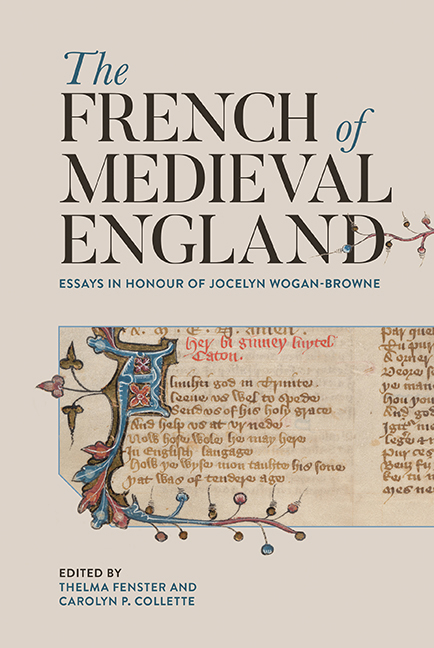Book contents
- Frontmatter
- Contents
- List of Illustrations
- List of Contributors
- List of Abbreviations
- Foreword: ‘The Light I Never Left Behind’: Jocelyn Wogan-Browne
- Introduction: Recognizing the French of Medieval England
- 1 The Gloss to Philippe de Thaon's Comput and the French of England's Beginnings
- 2 The Scandals of Medieval Translation: Thinking Difference in Francophone Texts and Manuscripts
- 3 Contrafacture and Translation: The Prisoner's Lament
- 4 Complaining about the King in French in Thomas Wright's Political Songs of England
- 5 The Chanson d’Aspremont in Bodmer 11 and Plantagenet Propaganda
- 6 The Use of Anglo-Norman in Day-to-Day Communication during the Anglo-Scottish Wars (1295–1314)
- 7 Middle English Borrowing from French: Nouns and Verbs of Interpersonal Cognition in the Early South English Legendary
- 8 William Langland Reads Robert Grosseteste
- 9 Disability Networks in the Campsey Manuscript
- 10 English Women and Their French Books: Teaching about the Jews in Medieval England
- 11 French Residents in England at the Start of the Hundred Years War: Learning English, Speaking English and Becoming English in 1346
- 12 French Immigrants and the French Language in Late-Medieval England
- 13 Fashioning a Useable Linguistic Past: The French of Medieval England and the Invention of a National Vernacular in Early Modern France
- 14 Admiring Ambivalence: on Paul Meyer's Anglo-Norman Scholarship
- 15 Twenty-First Century Gower: The Theology of Marriage in John Gower's Traitié and the Turn toward French
- 16 Royaumes sans frontières: The Place of England in the Long Twelfth Century
- Afterword
- Bibliography
- Index
- Publications of Jocelyn Wogan-Browne
- Tabula Gratulatoria
8 - William Langland Reads Robert Grosseteste
Published online by Cambridge University Press: 12 August 2020
- Frontmatter
- Contents
- List of Illustrations
- List of Contributors
- List of Abbreviations
- Foreword: ‘The Light I Never Left Behind’: Jocelyn Wogan-Browne
- Introduction: Recognizing the French of Medieval England
- 1 The Gloss to Philippe de Thaon's Comput and the French of England's Beginnings
- 2 The Scandals of Medieval Translation: Thinking Difference in Francophone Texts and Manuscripts
- 3 Contrafacture and Translation: The Prisoner's Lament
- 4 Complaining about the King in French in Thomas Wright's Political Songs of England
- 5 The Chanson d’Aspremont in Bodmer 11 and Plantagenet Propaganda
- 6 The Use of Anglo-Norman in Day-to-Day Communication during the Anglo-Scottish Wars (1295–1314)
- 7 Middle English Borrowing from French: Nouns and Verbs of Interpersonal Cognition in the Early South English Legendary
- 8 William Langland Reads Robert Grosseteste
- 9 Disability Networks in the Campsey Manuscript
- 10 English Women and Their French Books: Teaching about the Jews in Medieval England
- 11 French Residents in England at the Start of the Hundred Years War: Learning English, Speaking English and Becoming English in 1346
- 12 French Immigrants and the French Language in Late-Medieval England
- 13 Fashioning a Useable Linguistic Past: The French of Medieval England and the Invention of a National Vernacular in Early Modern France
- 14 Admiring Ambivalence: on Paul Meyer's Anglo-Norman Scholarship
- 15 Twenty-First Century Gower: The Theology of Marriage in John Gower's Traitié and the Turn toward French
- 16 Royaumes sans frontières: The Place of England in the Long Twelfth Century
- Afterword
- Bibliography
- Index
- Publications of Jocelyn Wogan-Browne
- Tabula Gratulatoria
Summary
William Langland wrote his masterpiece, Piers Plowman, in English, in a distinctly Germanic four-stress unrhymed alliterative metre and developed much of his ethical and political analysis out of a social model proudly conscious of its origins in Anglo-Saxon England. When his poem quotes the auctoritates around which many of its arguments circulate, most often verses from the Bible or wellknown apothegms from the Fathers, it follows a citational practice standard in vernacular texts, acknowledging its merely local claims to truth by recording them first in carefully rubricated Latin.
As a work of allegorical satire and narrative theology, however, Piers Plowman is mainly a French poem. French texts, written on both sides of the Channel, offer most of the best analogues for the poem's satirical allegories, such as the winding story of Lady Mede and her marriage told in its first vision; for its didactic allegories, such as the pilgrimage to Saint Truth that inaugurates its second vision; and for its picture allegories, such as the Castle of Caro that we encounter in its third vision. Like his most highly educated first readers, Langland may have known one or more of the difficult Latin prosimetra of the twelfth century by Alain de Lisle or Bernardus Sylvestris, and likely did know their great progenitor, Boethius's De consolatione philosophiae. But the assumptions about the resources of allegorical narrative that informed both his own craft as a poet and the horizon of expectations of his first audience were for the most part learned from a sophisticated, diverse and consistently unexpected genre of French allegories that extended from the turn of the thirteenth century down to Langland's day: from works, that is, such as Raoul de Houdenc's Songe d’enfer, Huon de Meri's Torneiment Anticrist and Voie de paradis, Guillaume de Lorris and Jean de Meun's Roman de la Rose, Nicholas Bozon's Char d’orgueil and Guillaume de Deguileville's Pèlerinage de l’âme.
- Type
- Chapter
- Information
- The French of Medieval EnglandEssays in Honour of Jocelyn Wogan-Browne, pp. 140 - 156Publisher: Boydell & BrewerPrint publication year: 2017
- 2
- Cited by

